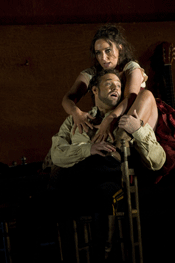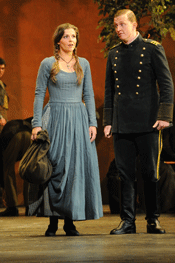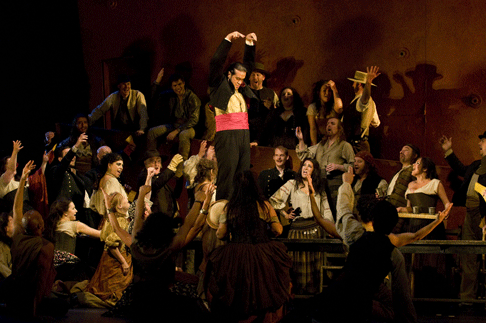3D is a higher grade technology than the 2D High Definition filming currently available at the Metropolitan Opera, The Royal Opera and other houses. The process, developed by RealD was used in James Cameron’s hit fantasy film Avatar, and in the most recent Disney Alice in Wonderland . Carmen is so dramatic that it could have been written for the movies. So why not a spectacular new version of the opera, using state of the art technology?
Francesca Zambello’s 2006 production is a good choice too. Visually, it’s very strong, so it will appeal to audiences who aren’t necessarily familiar with this opera, or even with opera at all. This staging lends itself specially well to film in many ways. It’s as colourful as the music. The town square is depicted in glowing earth tones, red, and ochre, with a large orange tree inn the background. The smuggling scene is shrouded in mysterious blues, greys and greens. In the final scene, the empty street is lit by garish light. Carmen has nowhere to hide.
 Bryan Hymel as Don José and Christine Rice as Carmen
Bryan Hymel as Don José and Christine Rice as Carmen
This is an eventful staging, full of details that translate well into film. The townsfolk are busy doing different things, selling fruit, washing themselves, playing guitars. A donkey is led through the crowd. The children’s choruses are delightful, each child an individual. The dance scenes are excellent, thanks to the combined forces of the Royal Opera and Royal Ballet. You can tell professional dancers apart from dancing singers, but that’s part of the fun. The toreadors are dazzling. No wonder the people adore the Corrida, and its colourful trappings. It’s circus, an escape from daily life, despite the blood and death.
First Night Syndrome affects every production, but this time there’s the film to think about too. So much is hanging on the success of the film, which is a historic first. So it was good to follow the first performance, imagining how it would develop as the run continues, and how it might be adapted for film. I looked out for details, like the way there are small ensembles high above the stage, easily missed during normal performance. From there, striking panoramas could be shot of the action below.
 Maija Kovalevska as Micaëla and Dawid Kimberg as Moralès
Maija Kovalevska as Micaëla and Dawid Kimberg as Moralès
Christine Rice’s dark good looks make her a good choice for the part. Her singing is precise and attractive, but wilder abandon would liven the characterization. Carmen’s lowdown, mean and dirty. Rice is well-bred and lady-like, not really the sort of girl who sticks men’s heads up her skirt to taunt them, like Carmen does in this staging. Rice is best when she shows the softer sides of Carmen’s personality, such as in the card game trio with Frasquita (Elena Xanthoudakis) and Mercédès (Paula Murrihy). All three singing particularly well. A wonderful vignette.
Aris Argiris’s Escamillo has huge potential. The “public” and “private” Escamillos co-exist, but often the public version dominates attention. The Act Two entrance is so dramatic that it overshadows all else. In this production he’s astride a real black stallion which carries him above the crowd. It takes your breath away, even if you know it’s coming. But what was interesting for me was the way Argiris conveyed the double edge of the Toreador song. Escamillo’s describing the spectacle of a bullfight, yet there’s a wistful vulnerability when he sings of the “dark eyes” that are watching. This is important, for what Escamillo and Carmen have in common is this inner sensitivity other people cannot see, but which they recognize in each other.
Film can show details easily lost in a large auditorium, so Argiris’s finely focused characterization will “grow” to advantage in close-ups. The part is written in an unusual way. The big entrance is dramatic, but it doesn’t last long. There’s more singing in the duel scene, where the part is written more conventionally. Then in the final act, Escamillo doesn’t actually have very much to sing at all. But therein lies the intelligence of Bizet’s approach. It’s not the macho big moments that make Escamillo, but the short, concealed glimpses of who he really is.
The critical part in the entrance scene isn’t the flamboyance, but the moment when Escamillo sees Carmen and knows instinctively that hers are the black eyes that have been awaiting him. The final love duet lasts only moments, but again, it’s powerful because it’s direct and private. Argiris’s Escamillo is much deeper than the usual flashy image. Because film can focus on detail, we’ll be able to appreciate this thoughtful approach to Escamillo. Indeed, this more intimate focus may also reveal the true depths of Christine Rice’s Carmen.
 Aris Argiris as Escamillo
Aris Argiris as Escamillo
It’s significant how Bizet contrasts the two couples, Carmen and Escamillo and José and Micaëla. The former don’t actually sing all that much, but the latter sing on, and on. Since the latter pair are more conventional, their parts are written more conventionally too. Brian Hymel’s Don José struggled vocally in the first act, but by the final, and critical act, he was in better form. He’ll be heard to advantage as the run progresses, and in the film. Singing, unlike bullfighting, isn’t sudden death.
Maija Kovalevska’s Micaëla on the other hand was superb from beginning to end. Sometimes, Micaëla seems like a minor part because she’s just a kid, but Kovalevska’s solid vocal authority brings out the role’s hidden power. Micaëla travels into smuggler’s dens to find José. She’s more of a man than he is, sweet as she may be. Indeed, she’s a prototype of Carmen herself, because she, too, is independent and takes risks for love. It’s her Covent Garden debut too, but she’s sung the role at the Met and in Munich. She has impressive experience elsewhere too.
Since Carmen is so familiar, we think we know it. But perhaps the film will reveal what we could still discover. I’m looking forward the the ROH film, 3D or not, if it’s well directed. Indeed, the angles and frames have probably already been planned. The direction of this revival could be tightened up, movements sharpened and French diction improved, but all in all, this was good.
Anne Ozorio
Carmen runs at the Royal Opera House, London, on 5, 8, 14, 16, 18, 21, 24, 26 June 2010. For more details, please see www.roh.org.uk This is a co-production with Den Norske Opera,Oslo and Opera Australia.
The 3D film will be available in cinemas worldwide from Autumn 2010. It’s part of a broader digital media strategy which ensures that the Royal Opera House has the capability to showcase its work across a wide range of media. This includes television and radio broadcasts, cinemas, BP Summer Big Screens, DVDs, online and via mobile technology. The Royal Opera House recently became the first arts organisation in Europe and the third in the world to launch its own iTunes U site.
![Christine Rice as Carmen [Photo by Mike Hoban courtesy of The Royal Opera]](http://www.operatoday.com/CARMEN-9946_0494_1-%28C%29RICE-.gif)


